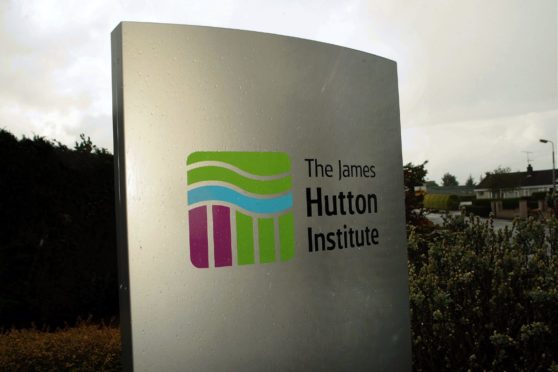One of Scotland’s leading agricultural research bodies – the James Hutton Institute (JHI) – posted a loss of £2.2 million last year.
The latest accounts for the James Hutton Group, which includes JHI and its commercial arm James Hutton Limited (JHL), show a deficit of £2.2m for the year to March 31, 2020. This compares to a deficit of £1.5m the year before.
The accounts show the group’s income for the year was £35.8m – down from £36.7m the year before – and its expenditure was £37.98m, compared to £38.25m in 2019.
In his report accompanying the accounts, JHI chairman Dr Ian Gambles said the bulk of the institute’s income in the year – totalling £21.8m – was in the form of Scottish Government Rural and Environmental Science and Analytical Services (RESAS) funding.
He said the institute, which has bases in Aberdeen and at Invergowrie, near Dundee, was continuing to look for opportunities to increase its external earnings and commercial sales, to reduce its reliance on RESAS funding.
“In 2019/20, we recognised income on non-RESAS research grants and contracts of £7.8m – £0.2m higher than the previous year,” added Dr Gambles.
“Although only a slight increase, significant effort had continued during the year both to sustain and increase these sources of funding.”
He said income from JHL – which aims to translate the institute’s scientific research into commercial services, licences, and products – decreased in the year to £3.5m, from £4.1m previously, and the company made a loss of £300,000.
“This reflected a combination of commercial and operational challenges, in particular resourcing and performance challenges within the analytical services division,” added Dr Gambles.
“Measures have been put in place to address the challenges, with a view to improving performance.”
Staff costs increased by £421,000 in the year to £23.9m due to “one-off costs” associated with restructuring in the second half of the year, while the staff count reduced to 556, from 578 previously.
Looking to the future, Dr Gambles said the £62m investment in the International Barley Hub and Advanced Plant Growth Centre at Invergowrie would be a “major milestone” for the institute.
He added: “We are actively seeking ways to capitalise on the opportunities presented by the challenges of the pandemic.
“We remain very positive about our scientific mission in the post-Covid-19 recovery period, and our ability to make significant scientific contributions across multiple priority areas of UK and Scottish Government policy.”
